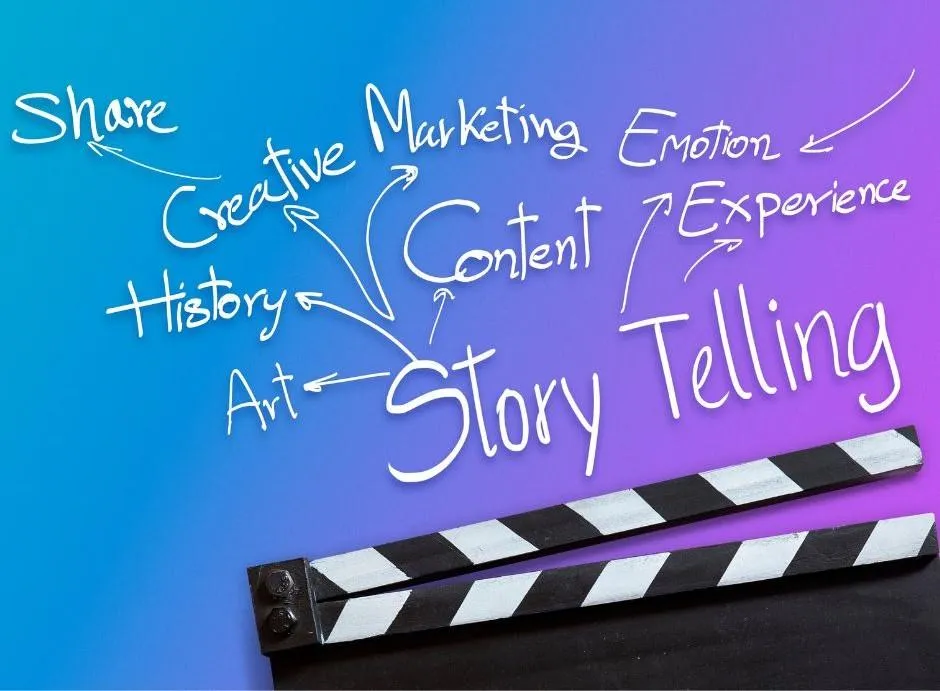Blog
Dedicated to providing you with invaluable tips, tricks, strategies, and insights to propel your business forward. Whether you're an entrepreneur, small business owner, or aspiring professional, this blog is designed to equip you with the knowledge and tools necessary for success in today's competitive landscape.
Get ready to unleash your business potential and ignite your growth!

The Power of Storytelling: How It Can Transform Your Marketing Strategy
In the world of marketing, creating a connection with your audience is key to success. One powerful tool that can help you achieve this is storytelling. By using stories to convey your brand's message, you can captivate and engage your target audience in a way that traditional marketing methods simply cannot. In fact, storytelling has become increasingly popular in recent years, as businesses recognize its ability to transform their marketing strategies and drive customer loyalty. If you're looking to take your marketing to the next level, then understanding the power of storytelling is essential. Keep reading to discover how incorporating storytelling into your marketing strategy can help your business thrive.

The Science behind Storytelling: Why It Works in Marketing
Storytelling has been an integral part of human communication for centuries. From ancient oral traditions to modern novels and films, stories have captivated and influenced individuals across cultures and generations. But what is it about storytelling that makes it so powerful in the realm of marketing?
Emotional Connection
Storytelling taps into our emotions, making it a powerful tool for marketers. When a story resonates with us on an emotional level, it creates a connection that fosters trust and loyalty toward a brand. By sharing relatable experiences or showcasing the impact of their products or services through storytelling, marketers can evoke emotions within their audience, leading to a stronger bond between the brand and its customers.
Memory Retention
Human brains are wired to remember stories. Research has shown that our brains process information better when presented in a narrative form. Stories activate multiple regions of the brain, including those responsible for processing emotions, memories, and sensory experiences. This multi-dimensional engagement enhances our ability to remember and recall information, making storytelling an effective strategy for marketers who want their messages to stick with their audience.
Attention Grabbing
In today's digital age, capturing and maintaining the attention of consumers is a significant challenge for marketers. Storytelling, with its ability to engage and immerse the audience, provides a solution to this problem. A well-crafted story has the power to captivate and hold the attention of individuals, cutting through the noise and distractions of modern advertising. By presenting information in a narrative format, marketers can effectively convey their brand's message and stand out in a crowded marketplace.
Persuasive Influence
Stories have the ability to persuade and influence our thoughts and behaviors. A compelling narrative can shape our perceptions, beliefs, and attitudes towards a brand. By strategically incorporating storytelling into their marketing strategies, businesses can influence consumer decisions and drive action. Whether it's through the use of relatable characters, authenticity, or a compelling plot, stories have the power to persuade consumers to choose one brand over another.
Differentiation and Brand Identity
In an increasingly competitive market, establishing a unique brand identity is crucial for success. Storytelling allows businesses to differentiate themselves by sharing their unique values, mission, and purpose in a way that resonates with their target audience. By crafting a compelling narrative that reflects the essence of the brand, marketers can create a distinct identity that sets them apart from their competitors.
In conclusion, storytelling is a powerful tool in marketing due to its ability to create emotional connections, enhance memory retention, grab attention, persuade consumers, and establish a unique brand identity. By harnessing the science behind storytelling, businesses can transform their marketing strategies and build strong, long-lasting relationships with their audience. Whether through videos, social media posts, or brand narratives, incorporating storytelling into your marketing efforts can elevate your brand and drive business growth.

Crafting an Engaging Brand Story: Capturing Your Audience's Attention
In the realm of marketing, storytelling has proven to be an invaluable tool for capturing the attention and loyalty of consumers. By crafting an engaging brand story, businesses can create a powerful connection with their audience and differentiate themselves in a crowded marketplace.
Know Your Audience
Before you can craft an effective brand story, it is essential to understand your target audience. Research their demographics, interests, and pain points to tailor your story to resonate with them on a deep level. By knowing your audience, you can create a narrative that speaks directly to their needs and desires.
Define Your Purpose and Values
Every brand has a unique purpose and set of values that define its identity. Identify what sets your brand apart and incorporate that into your story. Showcasing your core values and mission will not only resonate with your audience but also differentiate your brand from competitors. Authenticity is key in crafting a brand story that captivates and engages.
Find Your Narrative Arc
Just like in any compelling story, a brand story needs a narrative arc. Begin by introducing the problem or challenge that your product or service solves. Then, develop the tension by showcasing the struggles and obstacles faced by your target audience. Finally, provide resolution and demonstrate how your brand provides a solution to their problems. This narrative arc will keep your audience engaged and invested in your brand story.
Incorporate Emotion
Emotion is a powerful tool in storytelling and should not be overlooked in your brand story. Tap into the emotions of your audience by creating relatable characters or showcasing the impact of your product or service on real people's lives. Emotion will create a connection and foster loyalty towards your brand.
Use Visuals and Multimedia
Enhance your brand story by incorporating visuals and multimedia elements. This could include images, videos, infographics, or interactive content. Visuals not only grab attention but also help to reinforce your brand message and make your story more memorable.
Consistency Across Platforms
To ensure a cohesive and impactful brand story, it is important to maintain consistency across all marketing platforms. This includes your website, social media profiles, advertisements, and any other channels that your brand utilizes. Consistency will strengthen brand recognition and reinforce your story with your audience.
Listen and Adapt
Crafting an engaging brand story is an ongoing process. Listen to feedback from your audience and be open to adapting your story as needed. Pay attention to what resonates with your audience and what doesn't, and refine your brand story accordingly. This will ensure that your brand remains relevant and continues to capture the attention of your target audience.
In conclusion, crafting an engaging brand story is essential for capturing your audience's attention and fostering a strong connection with them. By understanding your audience, defining your purpose and values, creating a narrative arc, incorporating emotion and visuals, maintaining consistency, and being open to adaptation, you can create a brand story that captivates and engages your audience, ultimately driving business growth.

Storytelling Techniques for Effective Marketing Campaigns
Storytelling is a powerful marketing tool that can transform your brand's messaging and engage your target audience. By incorporating storytelling techniques into your marketing campaigns, you can create a memorable and impactful experience for consumers. Here are four storytelling techniques that can elevate your marketing campaigns:
Hero's Journey
The hero's journey is a classic storytelling technique that follows a protagonist on their transformative journey. In the context of marketing, your brand can position itself as the guide or mentor that helps consumers overcome challenges and achieve their goals. By showcasing your product or service as the solution to their problems, you can create a compelling narrative that resonates with your audience.
Emotional Appeal
Emotion plays a significant role in storytelling and can evoke a strong response from your audience. By incorporating emotional appeal into your marketing campaigns, you can create a deep connection with consumers. Use storytelling elements such as relatable characters, real-life anecdotes, or testimonials to elicit emotions that align with your brand's values and messaging.
User-Generated Content
User-generated content (UGC) is a powerful storytelling tool that leverages the experiences and stories of your customers. Encourage your audience to share their experiences with your brand through testimonials, reviews, or social media posts. By amplifying these authentic stories, you can create a sense of community and trust around your brand, ultimately driving engagement and loyalty.
Brand Archetypes
Archetypes are recurring symbols or character types that represent universal patterns in storytelling. By aligning your brand with a specific archetype, you can tap into the collective unconscious and connect with consumers on a deeper level. For example, an archetypal brand like Nike might embody the hero archetype, inspiring consumers to push their limits and achieve greatness.
Incorporating these storytelling techniques into your marketing campaigns can elevate your brand's messaging and resonate with your audience. By tapping into the power of storytelling, you can create an emotional connection with consumers, inspire action, and ultimately drive business growth.

The Emotional Connection: Leveraging Storytelling to Build Customer Trust
Building trust with customers is crucial for any business, and one effective way to do this is through storytelling. Storytelling allows you to connect with your audience on an emotional level, creating a deeper and more meaningful relationship. Here are some ways you can leverage storytelling to build customer trust:
Authenticity
Authenticity is key in storytelling. Customers want to feel like they are connecting with real people and real experiences. Share authentic stories about your brand, employees, or customers that showcase your values, mission, and commitment to providing a great customer experience. By being genuine and transparent, you can build trust and credibility with your audience.
Shared Values
Identify and communicate the values that your brand and customers share. Use storytelling to highlight how your brand aligns with these values and how your products or services can help customers live out those values. When customers see that your brand stands for something meaningful to them, they are more likely to trust and support your business.
Overcoming Challenges
Share stories of how your brand has overcome challenges and obstacles, whether it's through innovation, resilience, or a commitment to customer satisfaction. By showcasing your ability to navigate difficult situations, you demonstrate reliability and instill confidence in your audience.
Customer Success Stories
Incorporate customer success stories into your storytelling strategy. Highlight how your products or services have positively impacted your customers' lives or helped them achieve their goals. Include testimonials, case studies, and personal anecdotes that showcase real-life examples of your brand's value.
Consistency
Consistency in your storytelling is crucial for building trust. Ensure that your brand message remains consistent across all touchpoints, including your website, social media channels, advertising campaigns, and customer interactions. Consistent storytelling helps reinforce your brand's identity and builds familiarity and trust with your audience.
Empathy and Understanding
Use storytelling to show empathy and understanding towards your customers' pain points and challenges. By demonstrating that you understand their needs and have solutions to their problems, you build trust and position your brand as a reliable partner.
By leveraging storytelling to build an emotional connection with your audience, you can establish trust and loyalty. Remember to be authentic, share shared values, showcase your ability to overcome challenges, highlight customer success stories, maintain consistency, and show empathy. Through these strategies, you can create a strong foundation of trust and loyalty with your customers.

Measuring the Impact: Tracking Success through Storytelling Metrics
Storytelling can be a powerful tool in your marketing strategy, but how do you measure its impact? Tracking success through storytelling metrics is essential to understanding the effectiveness of your storytelling efforts and making informed decisions. Here are some key metrics you can use to measure the impact of your storytelling:
Engagement Metrics
Engagement metrics measure how well your audience is interacting with your storytelling content. This can include metrics such as likes, shares, comments, and click-through rates. By tracking these metrics, you can gauge the level of interest and involvement that your storytelling is generating.
Conversion Metrics
Conversion metrics measure how effective your storytelling is at driving action and achieving your marketing goals. This can include metrics such as conversion rates, lead generation, and sales. By tracking these metrics, you can determine whether your storytelling is successfully converting audience engagement into desired actions.
Brand Awareness Metrics
Brand awareness metrics measure how well your storytelling is increasing visibility and recognition for your brand. This can include metrics such as reach, impressions, and brand mentions. By tracking these metrics, you can assess the reach and impact of your storytelling on brand awareness.
Customer Sentiment Metrics
Customer sentiment metrics measure the emotional response and perception of your storytelling among your audience. This can include metrics such as sentiment analysis, customer feedback, and sentiment scores. By tracking these metrics, you can understand how your storytelling is influencing customer perceptions and emotions toward your brand.
Return on Investment (ROI) Metrics
ROI metrics measure the financial impact of your storytelling efforts. This can include metrics such as revenue generated, return on ad spend (ROAS), and customer lifetime value. By tracking these metrics, you can assess the financial return and profitability of your storytelling investments.
Long-Term Impact Metrics
Long-term impact metrics measure the sustained effects of your storytelling over time. This can include metrics such as customer loyalty, repeat purchases, and brand advocacy. By tracking these metrics, you can evaluate the long-term impact and value of your storytelling in building lasting customer relationships.
It is important to establish clear goals and objectives for your storytelling efforts and align your metrics with these goals. Regularly analyzing and evaluating these metrics will allow you to optimize your storytelling strategy, identify areas for improvement, and make data-driven decisions to enhance your marketing efforts.
In conclusion, measuring the impact of your storytelling through key metrics is crucial for understanding its effectiveness and driving strategic decision-making. By tracking engagement, conversion, brand awareness, customer sentiment, ROI, and long-term impact metrics, you can gain valuable insights into the success of your storytelling and optimize your marketing strategy for maximum impact.

Thanks for reading,
Kay McKenzie
Founder and CEO, Nouvs Copia - Marketing Agency
Stay connected and join my FREE business networking Facebook group for female entrepreneurs, by clicking here: Women in Alignment - Business Networking Community
Want to work with us & become a paid sponsor?
As a paid sponsor with Women in Alignment, you'll have access to tailored packages designed to meet your unique business goals. From spotlight features to exclusive collaborations, we offer customized opportunities to align your brand with our mission-driven audience
Let’s create a partnership that delivers value and results
Copyright 2025. Women in Alignment. All Rights Reserved.
The Women in Alignment (WIA) Premium Membership and its associated Facebook group are independently managed and are not affiliated with, endorsed by, or associated with Meta Platforms, Inc. or the Facebook organization. All content, services, and benefits offered through the WIA Premium Membership are solely provided by Women in Alignment and its administrators.


